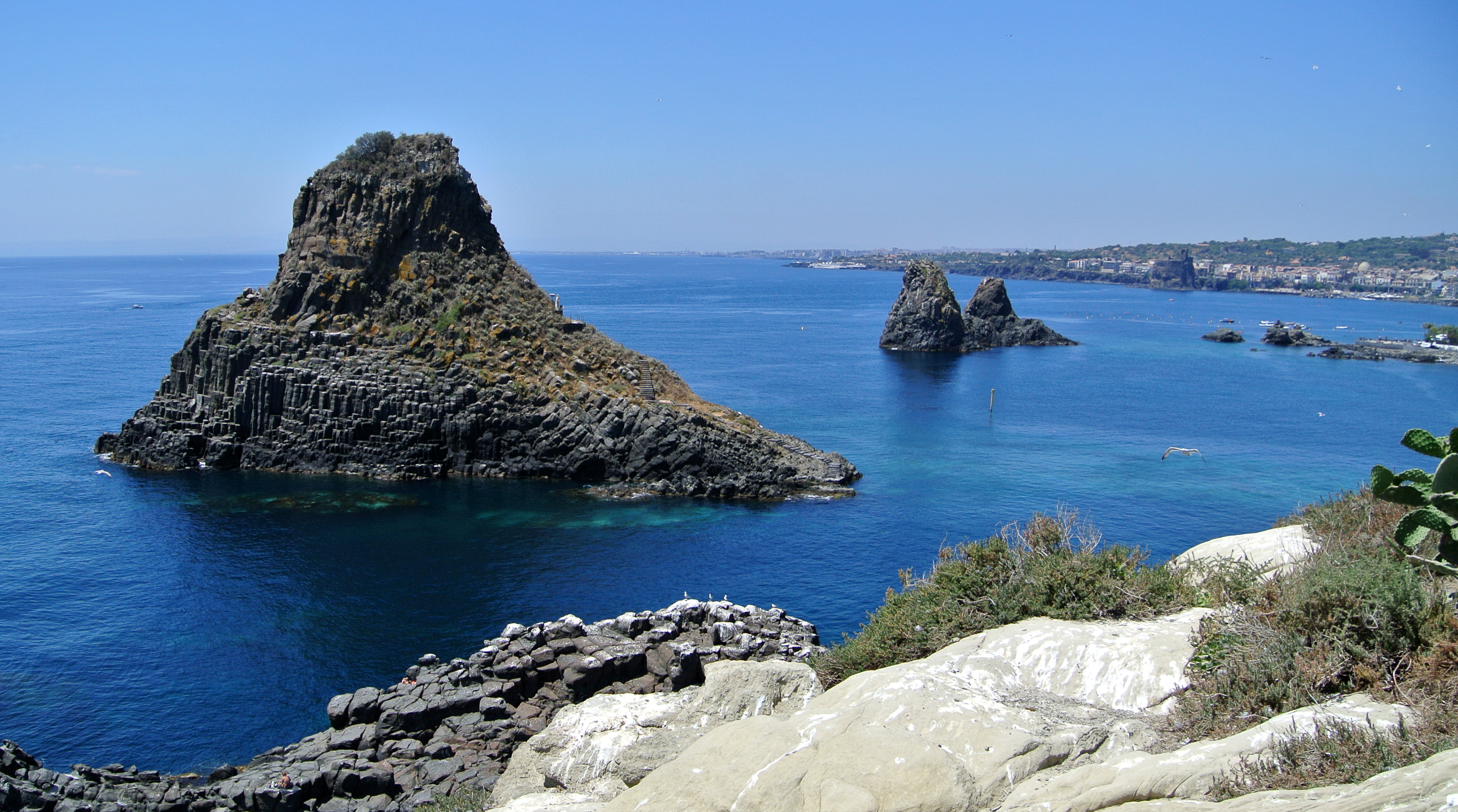Cyclopean Isles on:
[Wikipedia]
[Google]
[Amazon]

 The Cyclopean Isles (Italian: ''Isole Ciclopi''), noted for their rows of
The Cyclopean Isles (Italian: ''Isole Ciclopi''), noted for their rows of
basalt
Basalt (; ) is an aphanitic (fine-grained) extrusive igneous rock formed from the rapid cooling of low-viscosity lava rich in magnesium and iron (mafic lava) exposed at or very near the surface of a rocky planet or moon. More than 90 ...
ic columns piled one above another, lie not far from Mount Etna off the eastern coast of Sicily
(man) it, Siciliana (woman)
, population_note =
, population_blank1_title =
, population_blank1 =
, demographics_type1 = Ethnicity
, demographics1_footnotes =
, demographi ...
in the Mediterranean Sea
The Mediterranean Sea is a sea connected to the Atlantic Ocean, surrounded by the Mediterranean Basin and almost completely enclosed by land: on the north by Western and Southern Europe and Anatolia, on the south by North Africa, and on the ...
.
Geology
Formed about 500,000 years ago, the Cyclopean Isles are of volcanic origin and may at one time have been attached to Sicily. The Cyclopean Isles strongly resemble theGiant's Causeway
The Giant's Causeway is an area of about 40,000 interlocking basalt columns, the result of an ancient volcanic fissure eruption. It is located in County Antrim on the north coast of Northern Ireland, about three miles (5 km) northeast of ...
on the northern coast of Northern Ireland
Northern Ireland ( ga, Tuaisceart Éireann ; sco, label= Ulster-Scots, Norlin Airlann) is a part of the United Kingdom, situated in the north-east of the island of Ireland, that is variously described as a country, province or region. Nort ...
, and the Isle of Staffa
Staffa ( gd, Stafa, , from the Old Norse for stave or pillar island) is an island of the Inner Hebrides in Argyll and Bute, Scotland. The Vikings gave it this name as its columnar basalt reminded them of their houses, which were built from ver ...
off the western coast of Scotland
Scotland (, ) is a Countries of the United Kingdom, country that is part of the United Kingdom. Covering the northern third of the island of Great Britain, mainland Scotland has a Anglo-Scottish border, border with England to the southeast ...
. The latter, closest in appearance to the Cyclopean pair, differs mainly in having the columns piled in terraces, one above another.
Homer's legend
There is an ancient tradition that the islands at one time formed part of the mainland of Sicily.Homer
Homer (; grc, Ὅμηρος , ''Hómēros'') (born ) was a Greek poet who is credited as the author of the ''Iliad'' and the ''Odyssey'', two epic poems that are foundational works of ancient Greek literature. Homer is considered one of the ...
has a curious story about the manner in which they became detached, towards the end of the ninth book of the ''Odyssey
The ''Odyssey'' (; grc, Ὀδύσσεια, Odýsseia, ) is one of two major ancient Greek epic poems attributed to Homer. It is one of the oldest extant works of literature still widely read by modern audiences. As with the ''Iliad'', th ...
''. When Odysseus visited Sicily it was inhabited by the Cyclopes
In Greek mythology and later Roman mythology, the Cyclopes ( ; el, Κύκλωπες, ''Kýklōpes'', "Circle-eyes" or "Round-eyes"; singular Cyclops ; , ''Kýklōps'') are giant one-eyed creatures. Three groups of Cyclopes can be distinguish ...
, said to have had only one eye, on the forehead.
Odysseus encounters one of their number, Polyphemus
Polyphemus (; grc-gre, Πολύφημος, Polyphēmos, ; la, Polyphēmus ) is the one-eyed giant son of Poseidon and Thoosa in Greek mythology, one of the Cyclopes described in Homer's ''Odyssey''. His name means "abounding in songs and leg ...
, on his journey home to Ithaca, who kills two of Odysseus's men. Stuck inside Polyphemus's cave because he and his men are unable to move the boulder that blocks the entrance, Odysseus supplies Polyphemus with a special wine until he falls asleep, and blinds him by drilling the Cyclops's own wooden walking stick into his eye. Polyphemus opens the cave boulder and the Greeks escape to their ship; Polyphemus calls to the other Cyclopes for help and Odysseus, from the distance of his ship, begins to taunt and to jeer at him. Homer (Alexander Pope
Alexander Pope (21 May 1688 O.S. – 30 May 1744) was an English poet, translator, and satirist of the Enlightenment era who is considered one of the most prominent English poets of the early 18th century. An exponent of Augustan literature, ...
's translation) says:
Odysseus boasts that it was "Odysseus... Son of Laertes" who had burnt out Polyphemus's eye. Polyphemus invokes the vengeance of his father Poseidon, and:
Islands of Sicily
Volcanoes of Italy
Columnar basalts
Mediterranean islands
Archipelagoes of Italy
{{Sicily-geo-stub